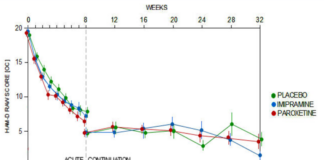Tag: negative effects of anti-depressants
What’s the Harm in Taking an Antidepressant?
We know that all drugs have side effects. That’s just part of the deal right? But is it really possible that an antidepressant can cause a sane person to act like a cold-blooded criminal?
Exploring Psychiatry’s “Black Hole”: The International Institute on Psychiatric Drug Withdrawal
When Carina Håkansson sent out an invitation for a symposium on "Pharmaceuticals: Risks and Alternatives," some of the world's top scientists, along with experts-by-experience, came from 13 countries to explore better ways to respond to people in crisis.
Study 329 Taper Phase
Most doctors still affect surprise at the idea SSRIs might come with withdrawal problems. Regulators knew very clearly since 2002 about the problems, but have decided to leave any communication of these issues in company hands.
Study 329 Continuation Phase
All the fuss about Study 329 centers on its 8-week acute phase. But this study had a 24-week Continuation Phase that has never been published. Until Now.
Moving Forward in the Science of Psychiatric Medication Discontinuation/Reduction
This week Live & Learn launched a research study on the experience of people labeled with mental disorders who have tried to stop taking psychiatric medications. This project -- the Psychiatric Medication Discontinuation/Reduction (PMDR) Study -- aims to understand the process of coming off psychiatric medications in order to better support those who choose to do so. The study seeks to answer the question: What helps people stop their psychiatric medications? What gets in the way of stopping?
Who Will Guard the Guardians of Psychiatry?
The assertion that the so-called antidepressants are being over-prescribed implies that there is a correct and appropriate level of prescribing and that depression is a chronic illness (just like diabetes). It has been an integral part of psychiatry's message that although depression might have been triggered by an external event, it is essentially an illness residing within the person's neurochemistry. The issue is not whether people should or shouldn't take pills. The issue is psychiatry pushing these dangerous serotonin-disruptive chemicals on people, under the pretense that they have an illness.
The Evidence-Based Mind of Psychiatry on Display
The writings of Pies and his colleagues, I believe, provide a compelling case study of cognitive dissonance. Cognitive dissonance arises when people are presented with information that creates conflicted psychological states, challenging some belief they hold dear, and people typically resolve dissonant states by sifting through information in ways that protect their self-esteem and their financial interests. It is easy to see that process operating here.
A Worldwide Epidemic – The Misuse of Anti-Depressant Medications
Not all people who have letters after their names are actually "gods" or even people who have any special powers to know things about us more than we can learn about ourselves, about our own bodies, and our own minds. Blindly following what someone says we need to be doing for our own health (mental or physical) and well-being just because they have a white jacket on (so to speak) is usually not in our best interests.
Making the Case Against Antidepressants in Parliament
On Wednesday, May 11, there will be an inquiry by a work group in the U.K.’s Parliament into whether increases in the prescribing of antidepressants are fueling a marked increase in disability due to anxiety and depression in the U.K. I wrote about a similar rise in disability in the United States in Anatomy of an Epidemic, and the All Party Group for Prescribed Drug Dependence, which is the Parliamentary group that organized the debate, asked me to present the case against antidepressants.
Restoring Study 329: Letter to BMJ
When we set out to restore GSK’s misreported Study 329 of paroxetine for adolescent depression under the RIAT initiative, we had no idea of the magnitude of the task we were undertaking. After almost a year, we were relieved to finally complete a draft and submit it to the BMJ, who had earlier indicated an interest in publishing our restoration. But that was the beginning of another year of peer review that we believed went beyond enhancing our paper and became rather an interrogation of our honesty and integrity. Frankly, we were offended that our work was subject to such checks when papers submitted by pharmaceutical companies with fraud convictions are not.
GSK to Face Class Action over Antidepressants for Children
A Sydney, Australia law firm has launched a class action on behalf of people who as children and adolescents were prescribed Glaxosmithkline's drug Paroxetine. Despite...
Antidepressant Made Germanwings Co-pilot “Panic”
Germanwings pilot Andreas Lubitz wrote, in a desperate, final email to his psychiatrist two weeks before slamming his A320 jet into the French Alps...
Study 329: 50 Shades of Gray
Access to data is more important than access to information about conflicts of interest. It is only when there is access to the data that we can see if interests are conflicting and take that into account. Problems don’t get solved unless someone is motivated for some reason. We need the bias that pharmaceutical companies bring to bear in their defense of a product, along with the bias of those who might have been injured by a treatment. Both of these biases can distort the picture but it’s when people with differing points of view agree on what is right in front of their noses that we can begin to have some confidence about what we have.
Study 329: The Data Wars Cross the Rubicon
It can be difficult to pinpoint transitions. The Rubicon that led from a Medical Republic to a Pharmaceutical Empire was crossed in 1962 with the passage of the Amendments to the Food and Drugs Act. This act put in place an apparatus of controlled trials, prescription-only status and disease indications that laid the basis for a global pharmaceutical hegemony, although the drift to Empire could still have been stopped at this point.













